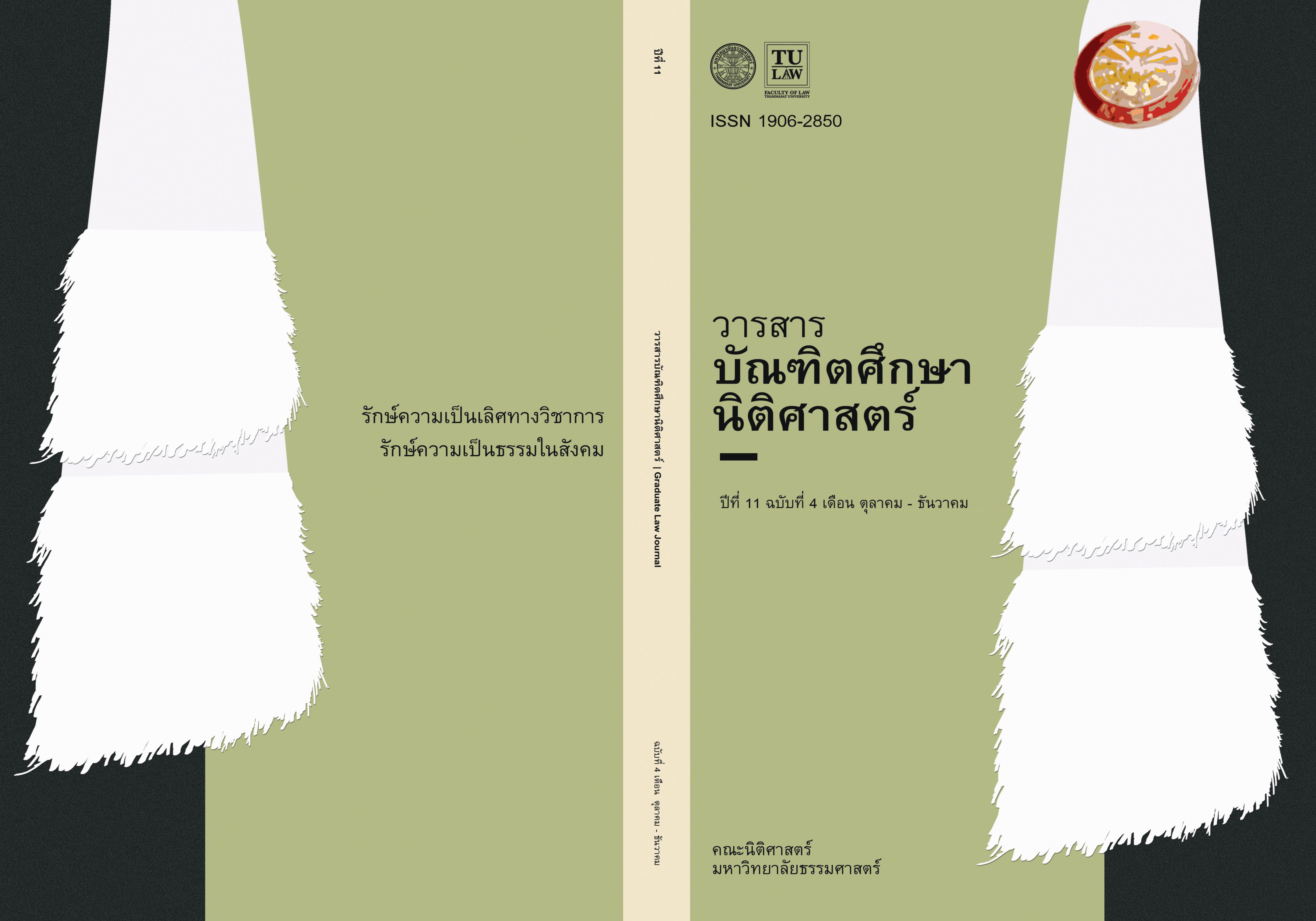มาตรการภาษีและค่าธรรมเนียมเพื่อบรรเทาปัญหาจราจรในกรุงเทพมหานคร
คำสำคัญ:
ค่าจราจรติดขัด, ค่าธรรมเนียมจราจรติดขัด, จราจร, ภาษี, ค่าธรรมเนียม, โซนนิ่ง, เมืองบทคัดย่อ
มาตรการจัดเก็บเงินค่าจราจรติดขัดเป็นหนึ่งในเครื่องมือที่ใช้จัดการปัญหาจราจร และสามารถมีสถานะทางกฎหมายได้ทั้งประเภทภาษีและค่าธรรมเนียม โดยจากการศึกษาพบว่าสถานะของค่าจราจรติดขัดที่เป็นค่าธรรมเนียมนั้นเหมาะสมกว่าภาษี เพราะมีความคล่องตัวในทางปฏิบัติเนื่องจากกระบวนการนิติบัญญัติมีความยืดหยุ่นกว่า และยังสอดคล้องกับลักษณะของมาตรการจัดเก็บเงินค่าจราจรติดขัดคือเป็นการจัดเก็บที่มีผลประโยชน์ตอบแทนโดยตรงกับผู้ที่ชำระเงินนั้นซึ่งได้รับบริการจากภาครัฐ เมื่อในปัจจุบันยังคงไม่มีการนำเครื่องมือดังกล่าวมาใช้บรรเทาความหนาแน่นของจราจรที่เกิดขึ้นในกรุงเทพมหานคร จึงเสนอให้มีการจัดเก็บค่าธรรมเนียมจราจรติดขัดนี้ในบริเวณชั้นในของเมือง โดยผลจากการศึกษาเปรียบเทียบมาตรการของประเทศต่าง ๆ พบว่าการนำมาตรการจัดเก็บเงินค่าธรรมเนียมจราจรติดขัดมาใช้จะบรรเทาปัญหาจราจรในกรุงเทพมหานครได้อย่างมีประสิทธิภาพเพราะมาตรการดังกล่าวมุ่งจัดการเฉพาะพื้นที่จราจรหนาแน่นเป็นพิเศษ อย่างไรก็ตาม เพื่อเป็นการบรรเทาอย่างยั่งยืนและเป็นระบบ มีความจำเป็นจะต้องใช้มาตรการจัดการความต้องการเดินทางอื่นประกอบด้วยเพื่อให้สามารถจัดการปัญหาในภาพรวมได้ เช่น การควบคุมรถจดทะเบียนใหม่ หรือ การทบทวนมาตรการภาษีและค่าธรรมเนียมที่เกี่ยวข้องกับการจัดการจราจรทั้งระบบ โดยควบคู่ไปกับการพัฒนาระบบขนส่งสาธารณะให้พร้อมพอที่จะทำให้ผู้ใช้ยานพาหนะเปลี่ยนพฤติกรรมจากการใช้ยานพาหนะในช่วงเวลาเร่งด่วนไปยังรูปแบบการเดินทางอื่นที่มีประสิทธิภาพมากกว่า
เอกสารอ้างอิง
สุปรียา แก้วละเอียด. การควบคุมความชอบด้วยกฎหมายของภาษีโดยองค์กรตุลาการในประเทศไทย: รายงานฉบับสมบูรณ์. กรุงเทพมหานคร: เดือนตุลา, 2558.
อรพิน ผลสุวรรณ์ สบายรูป. กฎหมายการคลัง. พิมพ์ครั้งที่ 3. กรุงเทพมหานคร: โครงการตำราและเอกสารประกอบการสอน คณะนิติศาสตร์ มหาวิทยาลัยธรรมศาสตร์, 2557.
ข่าวสด. “ชงเก็บเงินรถส่วนตัววิ่งเข้าเมือง บีบใช้ระบบขนส่ง-หลังเปิดรถไฟฟ้าครบ10สาย.” https://daily.khaosod.co.th/view_news.php?newsid=TURObFkyOHdNVEF5TURrMU9RPT0=§ionid=TURNd05RPT0=&day=TWpBeE5pMHdPUzB3TWc9PQ==, 1 กรกฎาคม 2561.
บริษัท ปัญญาคอนซัลแตนท์ จำกัด, บริษัท เอ 21 คอนซัลแตนท์ จำกัด, บริษัท แพลนโปร จำกัด, และ มหาวิทยาลัยนเรศวร. การศึกษาจัดทำโครงการบริหารจัดการความต้องการในการเดินทาง (Demand Management) เพื่อรองรับการพัฒนาโครงข่ายการจราจรและระบบขนส่งสาธารณะในเขตกรุงเทพมหานคร: รายงานฉบับสมบูรณ์. ม.ป.ท.: ม.ป.พ., 2558.
ประชาชาติธุรกิจ. “จราจรโคม่าขนส่งวิกฤต! เผย 10 ถนนรถวิ่งช้าสุด...บีบธุรกิจปรับตัว-เผาเบนซิน21ล.ลิตร/วัน.” https://www.prachachat.net/news_detail.php?newsid=1357815238&grpid=02&catid=07&subcatid=0700, 24 ธันวาคม 2560.
ภัทชา ด้วงกลัด. “ค่าธรรมเนียมรถติด ถึงเวลาแล้วหรือยัง?.” https://thaipublica.org/2012/09/congestion-charge-2/, 5 กันยายน 2560.
สำนักงานคณะกรรมการพัฒนาการเศรษฐกิจและสังคมแห่งชาติ. แผนพัฒนาเศรษฐกิจและสังคมแห่งชาติ ฉบับที่สิบสอง พ.ศ. 2560-2564. กรุงเทพมหานคร: สำนักงานคณะกรรมการพัฒนาการเศรษฐกิจและสังคมแห่งชาติ, 2560.
Andrea Broaddus, Todd Litman, Gopinath Menon. Transportation Demand Management: Training Document April 2009. N.p.: n.p., 2009.
Börje Johansson and Lars-Göran Mattsson. “Principles of Road Pricing.” In Road Pricing: Theory, Empirical Assessment and Policy. ed. by Börje Johansson and Lars-Göran Mattsson. p.7-33. Netherlands: Springer, 1995.
Dirk Van Amelsfort. Introduction to Congestion Charging: A Guide for Practitioners in Developing Cities. N.p.: n.p., 2015.
ITF. Implementing Congestion Charges. Paris: OECD Publishing, 2010.
John Tiley. Revenue Law. 6th ed. Oxford: Hart Pub., 2008.
Kalle Maatta. Environmental Taxes: An Introductory Analysis. Cheltenham: Edward Elgar, 2006.
National Academies of Sciences, Engineering, and Medicine. International Perspectives on Road Pricing. Washington, DC: The National Academies Press, 2005.
Sijbren Cnossen. Excise systems: a global study of the selective taxation of goods and services. Baltimore: Johns Hopkins University Press, 1977.
ดาวน์โหลด
เผยแพร่แล้ว
ฉบับ
ประเภทบทความ
สัญญาอนุญาต
บทความหรือข้อความคิดเห็นใด ๆ ที่ปรากฏในวารสารบัณฑิตศึกษานิติศาสตร์เป็นความรับผิดชอบของผู้เขียนบทความโดยเฉพาะ คณะนิติศาสตร์ มหาวิทยาลัยธรรมศาสตร์ และกองบรรณาธิการไม่จำเป็นต้องเห็นด้วย



